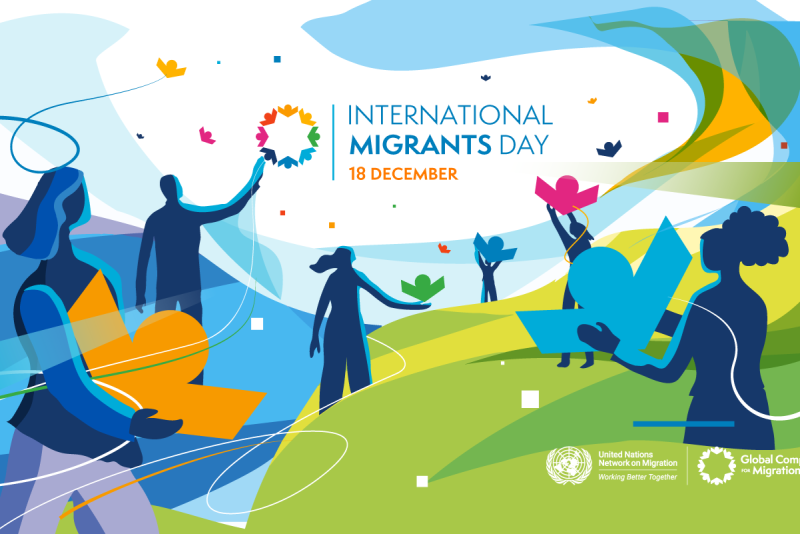United Nations Network on Migration in the Arab region celebrates International Migrants Day - “Migration and development go hand in hand”
Statements

United Nations Network on Migration in the Arab region celebrates International Migrants Day - “Migration and development go hand in hand”
This statement was initially issued by the Regional UN Network on Migration in the Arab region.
On the occasion of International Migrants Day (IMD), the Regional UN Network on Migration in the Arab region calls on States to consider the positive contributions that migrants bring to the table, as a common solution to rising global challenges and in line with commitments in the Global Compact for Safe, Orderly and Regular Migration (GCM).
For this International Migrants Day, the focus is Act Today on unlocking the power of migration and highlighting the transformative potential of migration and migrants for societies. In line with this, let us remember that migration is one of the oldest phenomena in the world, deeply rooted in our history, our very existence as human beings and our social fabric.
Since the beginning of time, people have migrated for various reasons and today, these reasons are still very much valid. They move in search for more dignified lives, sustained livelihoods, better economic opportunities but also many times, to escape from conflicts, to survive natural disasters, and to support their loved ones who they had to leave behind.
To do so, many migrants, including children and youth, embark on perilous journeys, in hopes that they will reach their goals and achieve their dreams. Beyond the various hardships they encounter along their migration journeys, migrants often experience difficulties in accessing basic services such as health and education, entering the formal labor market and integrating and assimilating into their new communities. They also often face the challenges of persecution, exploitation, discrimination, and xenophobia.
Despite all the challenges, migrants often support the hosting societies by contributing as essential workers, entrepreneurs and business owners to provide services and create jobs as well as taxpayers who contribute to sustain public services including the social security systems. Their knowledge, networks, and skills contribute greatly to the development of more diverse and resilient communities. As a result, many countries in the region rely heavily on migrant workers to sustain national economies.
According to UNDESA, in 2020, the Arab region hosted 41.4 million international migrants and refugees and around 44 per cent of all migrants and refugees from Arab countries stayed within the region. Arab countries received $57.9 billion in remittances, representing 8 per cent of global remittance inflows, exceeding foreign direct investment by 1.7 times. The more migrants are integrated in society, the better their rights are protected; migrants can seize opportunities to flourish and take part in the effort towards sustainable development and a peaceful and inclusive society.
Conversely, ongoing wars, conflicts, and displacement as a result of climate crises and other natural disasters in the region will not only deprive affected people of their human rights, but also create generations of people who will not be able to achieve their full potential.
The GCM places individuals at its core through people-centered, gender-responsive and child-sensitive approaches, ensuring protection and fulfilment of human and child rights and promoting the well-being of all migrants and the members of communities in countries of origin, transit, and destination.
The UN Network on Migration in the Arab region will continue advocating for migrants’ inclusion to contribute positively to sustainable development in their countries of origin, transit and destination and towards accelerating the implementation of the 2030 Agenda for the Sustainable Development Goals as active agents of change.
Today, let us remember those migrants who have come a long way and risen to success and also those who have fallen on their way; let us pay homage not just to the athletes, businesspersons, artists, doctors, nurses, scientists and teachers, but also to the drivers, cleaners, cashiers, delivery persons and nannies as well as mothers, fathers, grandparents and great-grandparents of us who have made a difference to us personally, and to our society.
Migration can benefit all of us, if it is effectively governed in a safe, orderly and regular manner. Let us look to migrants as a source of prosperity, innovation, and inspiration, and not of fear or burden.
For more information, please contact:
Regional UN Network on Migration in the Arab Region at <UNNMArabRegion@iom.int>
*References to Kosovo shall be understood to be in the context of United Nations Security Council resolution 1244 (1999).
Newsletter
Subscribe to our newsletter.